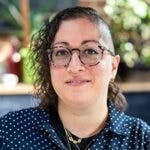Published: 8 October 2024
Last updated: 8 October 2024
I grew up in a very tightly-knit Jewish expat community overseas, followed by three years in a boarding house at a non-Jewish school in Australia, with girls who mostly came from rural and regional Victoria and New South Wales.
In Australia, I didn’t attend youth groups or any synagogue regularly, or have much involvement with the community beyond the year I spent working at the Australian Jewish News when I was 18.
In meeting non-Jewish people from all over the world, especially in Australia, there was a common theme and it was usually posed as a question, along the lines of, “You’re the first Jew I’ve ever met, can I ask you a question about...”.
The questions tended to be asking something along the lines of, for instance, why religious Jewish women cover their hair. Or why Jewish families were always walking around Caulfield on Saturday afternoons. Or why the Jewish men wore big fur hats (shtreimels) or little tiny skullcaps (kippot).
Basic questions about our culture that they’d always wanted to ask and never had the opportunity.
The large majority of Australians will never have met a Jew, will never have spoken to a Jew and know nothing about our culture or beliefs.
And the reason they never had that opportunity is that, as sometimes we forget, the Australian Jewish community really is very, very small. It probably sits around the 100-120,000 mark. That’s not the Melbourne or Sydney community, that’s the entire Jewish population in Australia.
For comparative purposes, there are just under one million Aboriginal Australians. There are around 820,000 Muslim Australians. And there are 920,000 Australians who identify as having Italian origins.
I would be surprised if there is anyone in Australia who has never heard a non-Jew make a quip about Jews and their money.
But there’s a gulf of difference between buying into ridiculous stereotypes and falling down the rabbit hole of deliberate, defamatory conspiracy theory.
We all know the insidiousness of those theories that surround our community; the blood libels, the allegations of government control, of media dominance, of wealth and influence. We’ve been subjected to them long before the Protocols of the Elders of Zion were disseminated outside Russia in the early 20th century and then translated into Arabic.
In a world of online misinformation campaigns, QAnon and other bad actors deliberately sewing divisive rhetoric and conspiracy theories, we know the damage this can cause.
An accelerant to this sort of damage is surely our small numbers in Australia.
The large majority of Australians will never have met a Jew, will never have spoken to a Jew and know nothing about our culture or beliefs, even those living in the big smoke. All they do know is the stereotypes and the fact that we like bagels. I doubt they even know about schmears or kreplach.
It’s easy to dehumanise someone from afar. It’s much more difficult when you know someone of that background and can't simply put them in the “other” bucket.
Remember that TV show Go Back To Where You Came From? It aired on SBS back at the height of the racist-charged immigration debate (one which, disappointingly and perpetually continues).
In a Big Brother, reality-type format, six Australian participants were dropped into war zones, ostensibly to help them have an “asylum seeker experience”. They also spend time with people who have sought or are seeking asylum in Australia.
Being Jewish is not being a victim, being Jewish is being a survivor. We have a beautiful culture: music, food, language, history, knowledge.
Not all of the participants had changes of heart or mind, but they certainly developed different perspectives. Because when faced with the real humanity of a situation, or lack thereof, it’s a much more powerful thing than having an argument in newspaper inches or on a Facebook page. Where people settle into their binaries, determined to never give an inch.
So where does this land the Jewish community? The government has appointed an envoy to fight antisemitisim. There have been campaigns to fight this hatred and people speaking out, both from within the community and outside it.
I truly do believe that there needs to be engagement beyond the boundaries of our community, not just on Holocaust education, but on what makes us Jewish.
Because being Jewish is not being a victim, being Jewish is being a survivor. We have a beautiful culture: music, food, language, history, knowledge.
It’s why we take pride in our Jewishness, whether religious or liberal, observant or secular.
I’m not a racism or antisemitism expert. I’m just a Jewish woman who’s been subjected to antisemitism at school, at work, in friendship circles and online.
The people who’ve shown the most visible care for community during the last horrendous year are the people who have known and spent time with us.
They know that while we have come from a history of trauma, exacerbated by our tiny size, we’re also a community of vibrant, creative, caring people who – broadly speaking – care deeply about the world in which we live.
Whatever way forward we choose to fight antisemitism, part of this has to be about connection and humanity with the broader community outside of our own.





Comments1
Ian Grinblat9 October at 01:02 am
Oh really, Isabelle?
If only they could discern the hearts of solid gold that beat under these shabby, frightening even exteriors, they would all just fall in love with us.
Piffle!
People of goodwill approach others openly, no special overtures, no need to support the causes, no need to man the barricades – just be real.